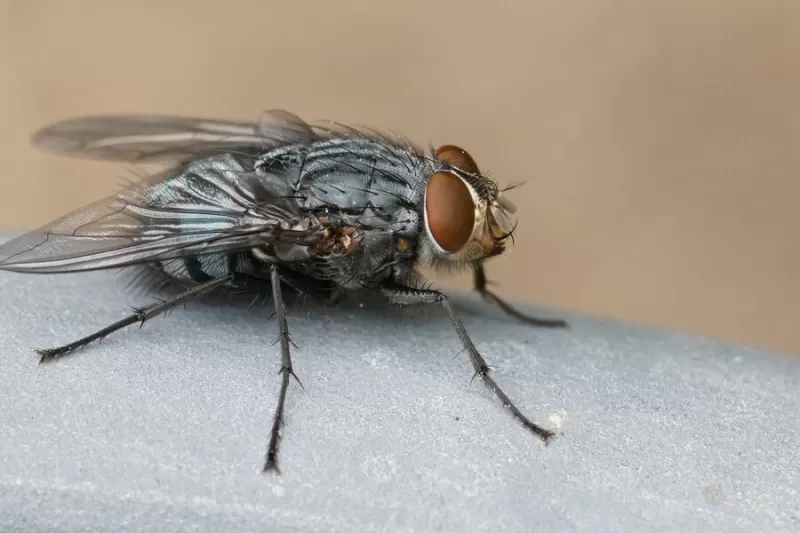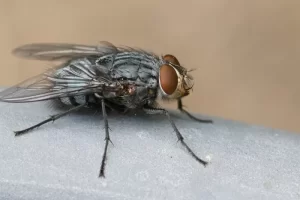Screwworm infections have become a significant health concern in Costa Rica, with the number of cases rising alarmingly. As of July 2024, the Ministry of Health reported an increase to 17 confirmed cases of myiasis caused by the screwworm in humans. This article will delve into the current situation, detailing the maggots prevention, identify their symptoms, and manage fly larvae infestations if they affect you.
What is a Screwworm Infection?
A screwworm infection, also known as myiasis, occurs when fly larvae infest the tissue of a living host. The screwworm fly, scientifically known as Cochliomyia hominivorax, lays its eggs on open wounds or mucous membranes. When the eggs hatch, the larvae, or screwworms, burrow into the flesh, causing severe damage and potential complications if not treated promptly.
Screwworm in Humans
Screwworm in humans can be particularly distressing due to the invasive nature of the larvae. Once the larvae hatch, they begin feeding on the host’s tissue, which can lead to significant tissue damage and infection. Screwworm in humans is not only painful but can also lead to severe medical complications if left untreated.
Current Situation in Costa Rica
In recent months, Costa Rica has seen a surge in infections of maggots inside the body of patients. Experts, including Dr. Adriana Troyo from the University of Costa Rica, have noted the aggressive nature of the screwworm fly and emphasized the need for heightened alertness and preventive measures. The increased cases have been particularly noted in regions with high livestock activity, which serves as a breeding ground for these pests.
Areas Affected
The most affected areas include rural regions and farming communities where cattle and other livestock are prevalent. These areas provide an ideal environment for screwworm flies to thrive and spread. The National Animal Health Service (SENASA) has been actively monitoring these zones and implementing measures to control the screwworm population.
How to Prevent Screwworm Infections

Maintain Hygiene and Wound Care
One of the most effective ways to maggots prevention is by maintaining proper hygiene and wound care. Ensure that any cuts, abrasions, or sores are cleaned thoroughly and covered with sterile dressings to prevent flies from laying eggs on the exposed tissue.
Use Insect Repellents
Applying insect repellents, especially in areas known to have high screwworm activity, can significantly reduce the risk of getting infected. Products containing DEET or other effective repellents should be used regularly.
Protect Livestock
Since screwworm flies often breed in livestock, protecting these animals can help control the population. Regularly inspect and treat wounds on animals, and use insecticidal treatments as recommended by veterinary professionals.
Environmental Management
Reducing fly breeding sites by maintaining cleanliness around living areas and farms is crucial. Proper disposal of animal waste and regular cleaning of animal pens can help minimize the fly population.
Maggots Prevention
An essential aspect of managing screwworm in humans is maggots prevention. Keeping wounds clean and covered helps prevent flies from laying eggs on exposed tissue. Additionally, using insect repellents and insecticidal sprays in areas prone to infestations is crucial. Maggots prevention involves continuous monitoring and maintaining high hygiene standards.
Spotting the Symptoms of Screwworm Infections

Identifying a screwworm in humans early is critical for effective treatment. Here are some common symptoms to watch for:
Visible Larvae in Wounds
One of the most apparent signs of a fly larvae infestation is the presence of larvae in wounds or maggots inside the body. The larvae may be seen moving within the wound, causing significant discomfort.
Increased Pain and Swelling
Infected wounds typically become more painful and swollen over time. This is due to the tissue damage caused by the burrowing larvae.
Foul Odor and Discharge
Screwworm-infested wounds often emit a foul odor and may produce a discharge. This is a result of the infection and tissue degradation caused by the larvae.
Fever and Malaise
In some cases, systemic symptoms like fever and general malaise may develop, indicating a more severe infection that needs immediate medical attention.
Managing Fly Larvae Infestation
If you suspect a screwworm in humans, you or your family, it is crucial to seek medical attention promptly, Express Medical helps you with any emergency or suspicion. Here are the steps typically involved in managing the fly larvae infestation:
Medical Treatment
Healthcare providers will clean the wound thoroughly, removing any visible larvae. In some cases, surgical intervention may be required to extract maggots inside the body from deeper tissues.
Antibiotic Therapy
Antibiotics are often prescribed to prevent secondary bacterial infections that can occur due to open wounds and the activity of maggots inside the body of patients.
Wound Care and Monitoring
Ongoing wound care is essential to ensure complete healing and to prevent re-infestation. Regular follow-up appointments with healthcare providers will help monitor the healing process.
Why Screwworm Cases are Rising

The rise in screwworm cases in Costa Rica has been attributed to several factors:
Climate Conditions
The warm and humid climate in Costa Rica provides an ideal environment for screwworm in humans to breed and thrive. Seasonal variations can lead to fluctuations in fly populations, contributing to increased cases during certain times of the year.
Livestock Movement
The movement of livestock across regions can spread screwworm flies to new areas. This is particularly challenging in agricultural communities, where animals are frequently transported for trade or breeding purposes.
Lack of Awareness
A lack of awareness about screwworm infections and how to prevent them can lead to higher infection rates. Educational campaigns and community outreach programs are essential to inform the public about the risks and maggots prevention strategies.
Maggots Inside Body
The presence of maggots inside body tissue is a severe complication. These maggots cause extensive damage as they feed on living tissue, leading to further infection and health complications. Preventing the occurrence of maggots inside body tissues requires prompt and effective treatment of wounds and infestations.
Government and Community Response

The Costa Rican government, through the Ministry of Health and SENASA, has been proactive in addressing the screwworm problem, both in case management and in maggots prevention. Measures include:
Surveillance and Monitoring
Increased surveillance and monitoring in high-risk areas help detect and manage screwworm outbreaks promptly. This involves regular inspections and data collection on fly populations and infection rates.
Public Education
Educational campaigns aimed at raising awareness about screwworm prevention and treatment are crucial. These campaigns provide valuable information to both urban and rural populations, helping reduce infection rates.
Veterinary Interventions
For livestock, veterinary interventions such as routine inspections, wound treatment, and insecticide applications are vital. These measures help control the screwworm population and prevent the spread of infections.
Fly Larvae Infestation
Fly larvae infestation is a critical issue that requires immediate attention. Regular inspections and treatment of livestock wounds can help prevent fly larvae infestation. In residential areas, maintaining cleanliness and using insecticides can significantly reduce the risk.
Conclusion
Screwworm infections are a growing concern in Costa Rica, affecting both humans and livestock. Understanding how to prevent, identify, and manage these infections is crucial for protecting public health and maintaining the wellbeing of the community. By following proper hygiene practices, using insect repellents, protecting livestock, and staying informed about the risks, individuals can significantly reduce their chances of encountering these harmful pests.
If you suspect a screwworm infection or need more information on how to protect yourself and your animals, contact your local health provider or reach out to Express Medical Costa Rica. Their experienced team is ready to assist you with the highest quality care and advice to ensure your health and safety. Don’t wait—take action now to protect yourself and your loved ones from screwworm infections.




